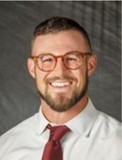contact
Jade Sutton
Administrative Assistant II
Recovery Capital for Substance Use Disorder: Assets, not Abstinence
| Date: | Friday, April 26, 2024 |
| Time: | 11 a.m. to 1 p.m. |
| Location: | University of Maryland School of Dentistry - Live Webinar via Zoom |
| Tuition: | Dental Professionals: $69.00 |
| Credits: |
2 CDE credit hours - lecture The University of Maryland School of Dentistry designated this activity for 2 Continuing Dental Education hours. |
| Target Audience: | All dental professionals |
| Presented by: | Alex Elswick, BA, MS, PhD |
| Conflict of Interest: | Nothing to disclose. |
Register Here
Speaker Biography
 Alex Elswick, BA, MS, PhD, joined the Department of Family Sciences in 2020 as an Assistant Extension Professor for Substance Use Prevention and Recovery. He began his journey with the department as a graduate student in 2015, where he earned his Masters and Ph.D. and later served Family and Consumer Sciences Extension as an Extension Associate and as an Extension Specialist. Using this experience, Dr. Elswick’s Extension emphasis focuses on equipping Extension to build recovery capital in the community. Dr. Elswick’s research agenda examines long-term recovery from substance use disorder. In particular, much of his research examines recovery capital, an assets-based approach to understanding addiction recovery. As co-founder of a Lexington-based non-profit organization called Voices of Hope, Dr. Elswick is a tireless advocate for people with substance use disorder. He works to promote long-term recovery by providing education in the community, reducing stigma, and studying the effectiveness of recovery support services. His professional experience, non-profit work, and research agenda all focus on long-term recovery. But most importantly, Alex is himself a person in long-term recovery from the chronic disease of addiction.
Alex Elswick, BA, MS, PhD, joined the Department of Family Sciences in 2020 as an Assistant Extension Professor for Substance Use Prevention and Recovery. He began his journey with the department as a graduate student in 2015, where he earned his Masters and Ph.D. and later served Family and Consumer Sciences Extension as an Extension Associate and as an Extension Specialist. Using this experience, Dr. Elswick’s Extension emphasis focuses on equipping Extension to build recovery capital in the community. Dr. Elswick’s research agenda examines long-term recovery from substance use disorder. In particular, much of his research examines recovery capital, an assets-based approach to understanding addiction recovery. As co-founder of a Lexington-based non-profit organization called Voices of Hope, Dr. Elswick is a tireless advocate for people with substance use disorder. He works to promote long-term recovery by providing education in the community, reducing stigma, and studying the effectiveness of recovery support services. His professional experience, non-profit work, and research agenda all focus on long-term recovery. But most importantly, Alex is himself a person in long-term recovery from the chronic disease of addiction.
Course Description
The purpose of this workshop is to describe recovery capital as a predictor of long-term addiction recovery. In part one, we begin by characterizing substance use disorder (SUD) as a chronic condition. In part two, we lean into the complexity of the heterogeneity of SUD and recovery as a process of change. Finally, in part three, we focus on building community recovery capital to promote recovery in our communities.
Course Objectives
At the conclusion of this course, participants should be able to:
- Define addiction as a chronic disorder.
- Explain recovery as a process of change.
- Describe the importance of recovery capital in sustaining recovery.
- Explain prosocial activity as recovery support.
